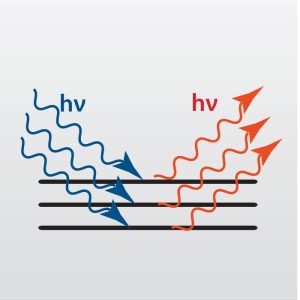Ellipsometry
Home » Our Techniques » Spectroscopy » Ellipsometry
Ellipsometry is a powerful analytical tool for the characterization of thin films in many materials, including semiconductors, dielectric films, metals and polymers. Also known as Spectroscopic Ellipsometry (SE), it is a non-contact, non-destructive optical technique, which measures the polarization change of reflected light after interaction with a sample. This change in polarization is related to material properties.
Ellipsometry is primarily used to measure film thickness, the refractive index (n) and the extinction coefficient (k), but it can also be used to investigate other properties that affect the polarization of light, such as roughness, optical anisotropy (birefringence), crystalline nature, composition, optical bandgap and thermal expansion. Please note that this technique does not measure these parameters directly. In order to extract useful information about thin films, a model is constructed that describes the optical parameters of the sample. Then, the unknown parameters are fitted to obtain a best match between the theoretical response and the experimental data.

Ideal Uses of Ellipsometry
- Thickness, optical constants of organic and inorganic thin films on flat substrates
- Individual layer thicknesses of multi-layer samples
Strengths
- Non-contact, non-destructive
- Not affected by intensity instabilities of the light source or atmospheric absorption
- Fast
- Precise thin film thickness and optical constants measurements
Limitations
- No direct measurement of material properties; an optical model of the sample must be fitted to the data
- Requires optically flat sample surfaces
Ellipsometry Technical Specifications
- Acquired data: Reflection and transmission ellipsometric data, polarized transmission and reflection intensity (wavelength range 192–1689 nm)
- Lateral information: 200 μm or 2 mm, depending on spot size. Automated sample translation stage (150×150 mm) available for mapping procedures
- Accuracy (thickness, optical constants): Mainly determined by how well the optical model describes the real sample. Precision (repeatability) can be better than 0.1 nm for thickness and better than 0.001 for n and k
- Sample type & requirements: Solids, thin layers and multilayers with optically flat substrates. Thickness from sub-monolayer coverage to μm range
- Heating experiments: Temperature (max. 300°C) dependent measurements are possible in different atmospheres
- Spot size: 200 μm or 2 mm
Would you like to learn more about using Ellipsometry?
Contact us today for your Ellipsometry needs. Please complete the form below to have an EAG expert contact you.